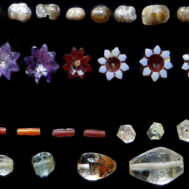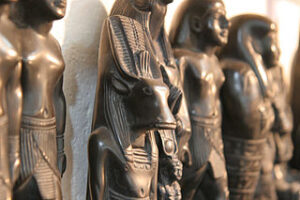
Souvenirs from Luxor, 16 May 2011, photo by Alexander Baranov, CCA 2.0 Generic license.
A 56 year old French tourist named Nathalie, a lawyer on a ten-day Nile cruise vacation with friends, purchased an attractive souvenir at an art gallery at the Sofitel Winter Palace Hotel in Luxor in January 2024. She paid €250 for a simple statue of a seated figure wearing a loincloth, resting his hands on his knees. The statue appealed to her. “I had no idea that he would not bring me luck,” she told Le Figaro several weeks later, having spent eight days in a Luxor jail.
When Nathalie tried to board her plane at Luxor airport for her flight home, her suitcase was x-rayed and the metal statuette was spotted by security. The Archaeological Unit experts at the airport examined the statue and decided it was 4500 years old. She was held for trafficking antiquities and taken to the city police station, where she was locked in a cell, spending the night with 40 other people.
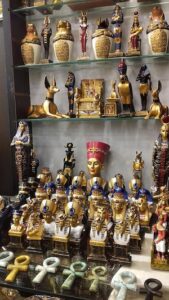
Replicas of Egyptian Monuments on Sale at Cairo Airport, photo Reem Al-Kashif, 12 July 2018, CCA-SA 4.0 Int’l.
Nathalie was given a court appointed lawyer who told her that she was presumed guilty and should apologize to the police. “It was very hard to see the extent to which he did not defend my interests,” she said. The CEO of the travel agency organizing her trip tried to advocate for her but was only able to obtain slightly better conditions for her stay in the jail. He told Le Figaro that state security had taken over the case and his contacts could do little: “state security does what it wants.”
Two days later, Nathalie appeared before a judge to give her story, and the gallery owner testified that it was a souvenir and identified the factory where dozens of similar pieces were sitting in inventory. The judge paused the case but only to allow for further analysis of the statue, and Nathalie was not released for another week. She later said that she spent her days in a cell but was allowed to sleep on a couch in an office at night.
Questioned about the arrest of a tourist for possessing a souvenir from a hotel gift shop, a top official at the Egyptian Antiquities Authority explained that the green patina on the object prevented the airport experts from identifying the object as a copy and they therefore decided it must be genuine. According to Al-Ahram Weekly, the prosecutor-general assigned a committee to determine the statue’s authenticity but despite the gallery owner’s testimony, they also were unable to decide this, and transferred the object to the archaeological laboratory at the Luxor Museum. The laboratory staff used mechanical and chemical techniques to remove the patina. After doing so, the marks of chisels and scrapers were clear, showing the statue was modern in origin. Nathalie was released but told she was barred from entering Egypt ever again.
Since the story became public, Egyptian officials have been backtracking and making excuses. The police announced that she was not banned from returning to Egypt; she would be welcome whenever she chose to come.
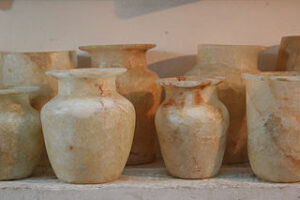
Souvenirs from Luxor, 16 May 2011, photo by Alexander Baranov, CCA 2.0 Generic license.
The ‘high official’ who spoke on condition of anonymity, told Al-Ahram that it could be a violation of Egyptian law to make a replica that so closely resembled an antiquity. He said, “It falls under fraudulent practices that could cast doubt on the authenticity of other antiquities. In such cases, an intervention is required using laboratory techniques not present at airports.”
When Nathalie arrived in Paris she was ‘welcomed’ by the Egyptian ambassador and a zoom call was arranged with the Minister of Tourism and Antiquities. She was also offered a free two week vacation in Egypt. A spokesman for the ministry, Ahmed Youssef, said that the ministry is speaking to the Egyptian Tourism Federation and the Chamber for Souvenir Shops and Bazaars about the incident and asking them to issue electronic receipts with detailed descriptions when selling replicas to tourists.
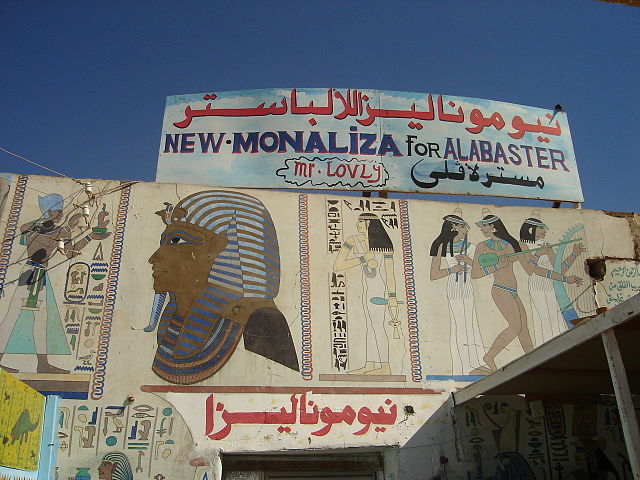 Immagine dall'Egitto - folklore/tourism in Egypt, photo by Codadilupo78, 10 November 2007, CCA-SA 3.0 Unported.
Immagine dall'Egitto - folklore/tourism in Egypt, photo by Codadilupo78, 10 November 2007, CCA-SA 3.0 Unported. 

